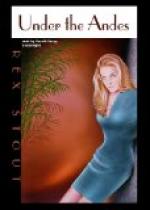There was a movement in the alcove. Four of the attendants came forward, carrying a curious framework apparently composed of reeds and leather, light and flexible, from the top bar of which hung suspended several rope-like ribbons, of various lengths and colors and tied in curious knots. They placed it on the ground before the double throne, at the feet of Desiree.
All doubt was then removed from my mind concerning the identity of our captors and their king. For these bundles of knotted cords of different sizes and colors I recognized at once.
They were the famous Inca quipos—the material for their remarkable mnemonic system of communication and historical record. At last we were to receive a message from the Child of the Sun.
But of what nature? Every cord and knot and color had its meaning—but what? I searched every avenue of memory to assist me; for I had latterly confined my studies exclusively to Eastern archeology, and what I had known of the two great autochthonous civilizations of the American Continent was packed in some dim and little used corner of my brain. But success came, with an extreme effort.
I recollected first the different disposition of the quipos for different purposes—historical, sacred, narrative, et cetera. Then the particulars came to me, and immediately I recognized the formula of the quipos before the throne. They were arranged for adjudication—for the rendering of a verdict.
Harry and I were prisoners before the bar of the quipos! I turned to him, but there was not time for talk. The king had risen and stretched out his hand.
Immediately the vast assemblage rose from their stone seats and fell flat on their faces. It was then that I noticed, for the first time, an oval or elliptical plate of shining gold set in the wall of the cavern just above the outer edge of the alcove.
This, of course, was the representation of Pachacamac, the “unknown god” in the Inca religion. Well, I would as soon worship a plate of gold as that little black dwarf.
For perhaps a minute the king stood with outstretched arm and the Incas remained motionless on their faces. Then he resumed his seat and they rose. And then the trial began.
The king turned on his throne and laid his hand on Desiree’s arm; we could see her draw away from his touch with an involuntary shudder. But this apparent antipathy bothered his kingship not at all; it was probably a most agreeable sensation to feel her soft, white flesh under his black, hairy hand, and he kept it there, while with the other arm he made a series of sweeping gestures which I understood at once, but which had no meaning for Desiree. By her hand he meant the quipos to speak.
We had a friend in court, but she was dumb, and I must give her voice. There was no time to be lost; I stepped to the edge of the column and spoke in a voice loud enough to carry across the cavern—which was not difficult in the universal silence.




